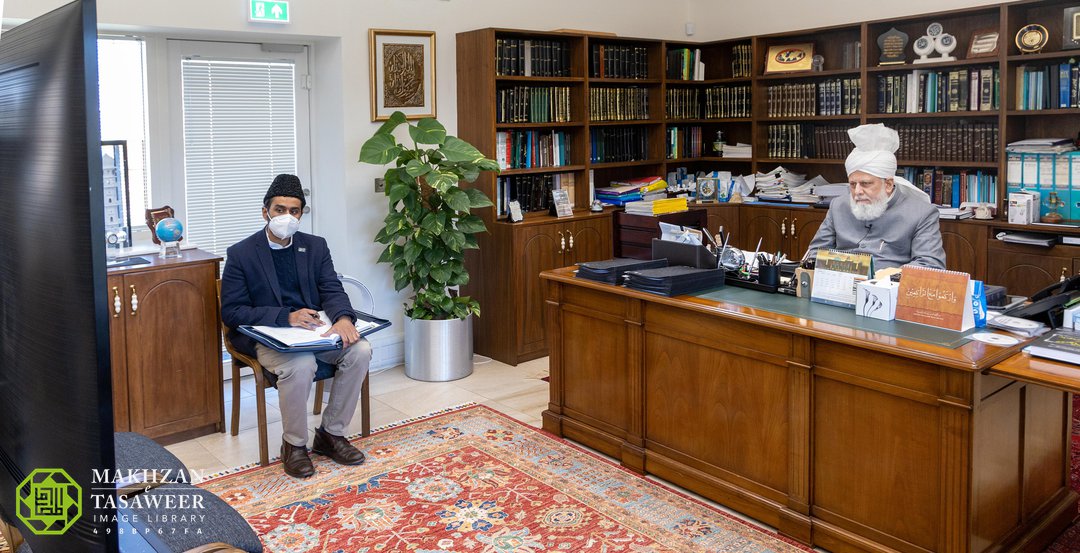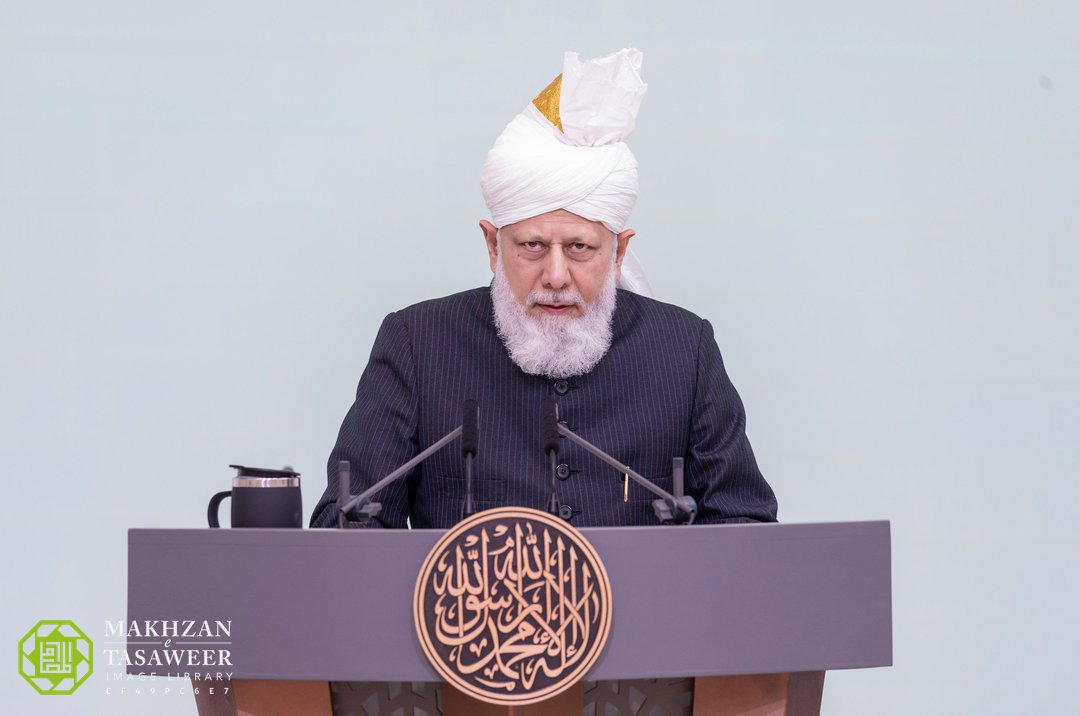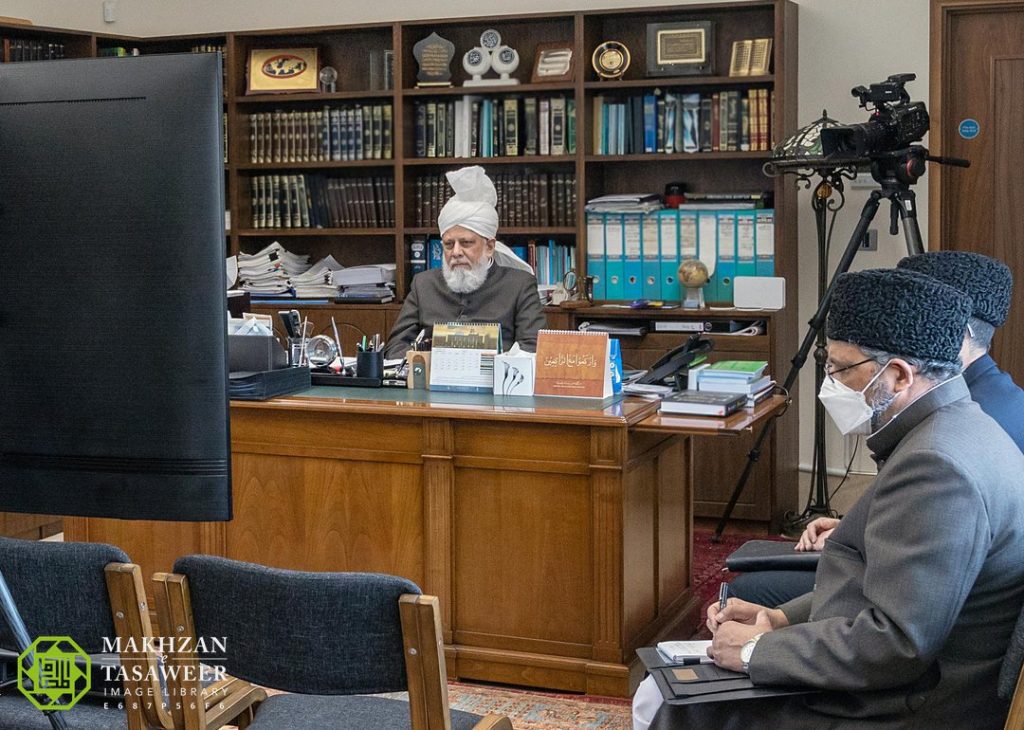
Members of Majlis Atfal-ul-Ahmadiyya from North of the UK have Honour of a Virtual Meeting with Head of the Ahmadiyya Muslim Community
“If your behaviour is good, people will get attracted towards you and in this way, you can make more friends” – Hazrat Mirza Masroor Ahmad
On 1 May 2021, the World Head of the Ahmadiyya Muslim Community, the Fifth Khalifa (Caliph), His Holiness, Hazrat Mirza Masroor Ahmad held a virtual online meeting with members of Majlis Atfal-ul-Ahmadiyya aged between 13 and 15 from the North of the United Kingdom.
His Holiness presided the virtual meeting from his office in Islamabad, Tilford, whilst 77 members of Majlis Atfal-ul-Ahmadiyya gathered at the Darul Amaan Mosque in Manchester.
Following a formal session starting with recitation of the Holy Quran, members of Majlis Atfal-ul-Ahmadiyya had the opportunity to ask His Holiness a series of questions regarding their faith and contemporary issues.
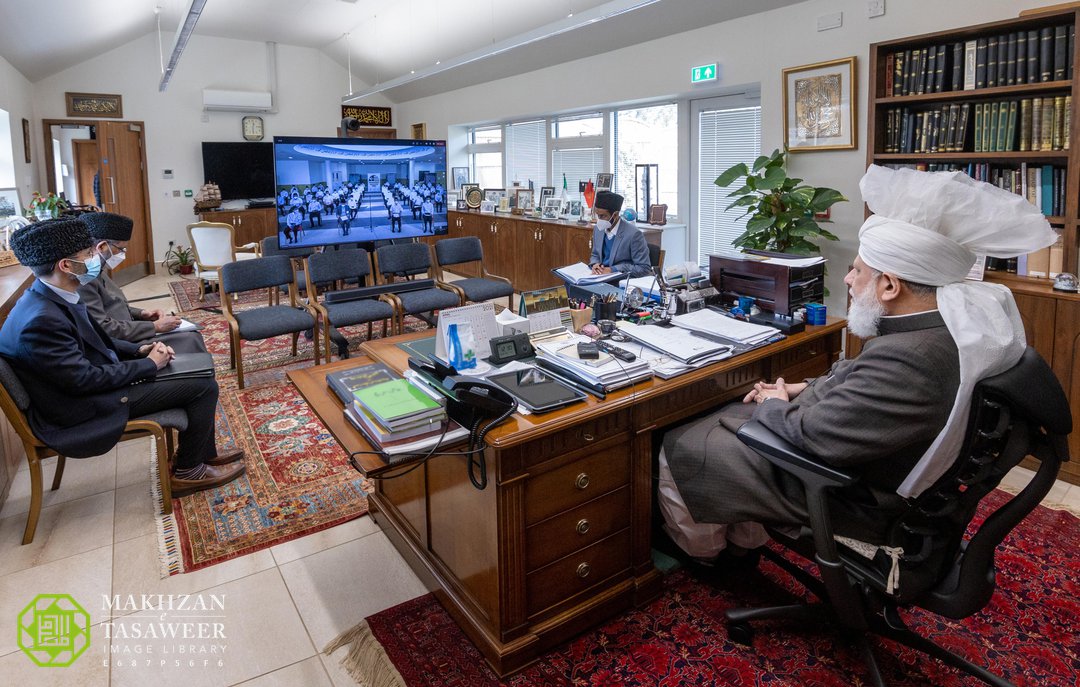
One of the Atfal attending the meeting asked His Holiness if being the Khalifa of the time was a difficult responsibility and what the most challenging aspect of it was.
Hazrat Mirza Masroor Ahmad said:
“The work of the Khalifa is always challenging because when you see that whatever you are doing, you are answerable direct to Allah the Almighty for all your actions and for all your responsibilities you are discharging. If you have a fear of Allah, then every moment which passes should make you God-fearing and that is a great challenge.”
Another child asked His Holiness how the children can cope with stresses of life and the challenges that come with the pandemic whereby they cannot go to Mosques or attend Atfal events as they used to in the past.
His Holiness said that to some degree activities have restarted for children whereby they can go to schools. His Holiness said that being back at school ought to reduce the frustrations and anxieties of children.
Outside of school time, His Holiness encouraged members of Majlis Atfal-ul-Ahmadiyya to utilise any extra time they may have in a positive and educative way. He said they should read regularly, especially the books of the Promised Messiah (peace be upon him).
Explaining the best way to spend their time after school, Hazrat Mirza Masroor Ahmad said:
“The best way of spending your time is that you should spend some time, after completing your homework, on the reading of the books of the Promised Messiah (peace be upon him) or the other literature of the Ahmadiyya Muslim Community. This is how you can increase your religious knowledge and wisdom and increase your faith as well.”
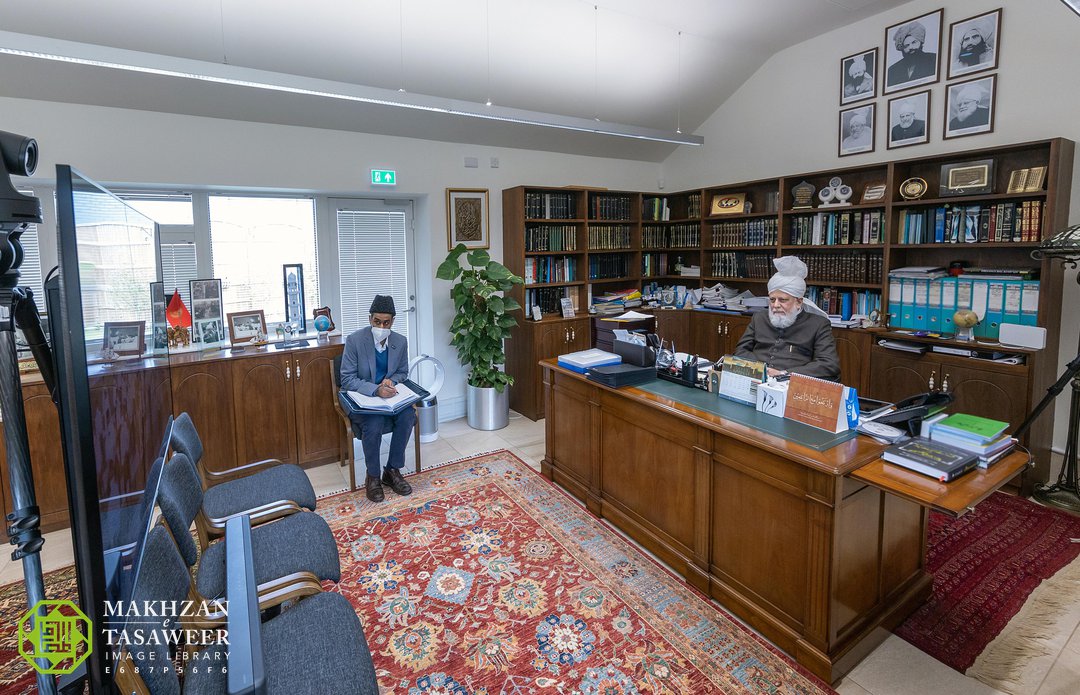
His Holiness was asked how he himself had sought to morally train and guide his children when they were younger.
In response, Hazrat Mirza Masroor Ahmad said:
“I think my children’s mother played a vital role in training them, instead of myself.”
Thereafter, Hazrat Mirza Masroor Ahmad said:
“The best way is that fathers should set their own example before their children. If fathers are offering five daily prayers, they can ask their children to offer the five daily prayers, and offering the five daily prayers is the best way to discipline your children. Then, when the father is reciting and reading the Holy Quran daily, then children will know that their father is doing it, so they should also do it. And if inside your house the environment is good and your parents are living amicably – there is no quarrelling and shouting or crying in your house – the children will also get better lesson. So, when, one day, you become a father you should try to follow these instructions.”
Another Tifl asked His Holiness what ought to be the qualities of an exemplary Tifl and how he could serve the Ahmadiyya Muslim Community and the Caliphate of the Ahmadiyya Muslim Community.
Giving a detailed response, Hazrat Mirza Masroor Ahmad said:
“An exemplary Tifl should be very regular and punctual in offering the five daily prayers. After the age of ten, it is obligatory on you to offer the five daily prayers and if possible, they should be offered in congregation – if you are living near the Mosque. Then, try to recite and read the Holy Quran daily, even if it is one or two Rukus [sections] or a small portion of it.”
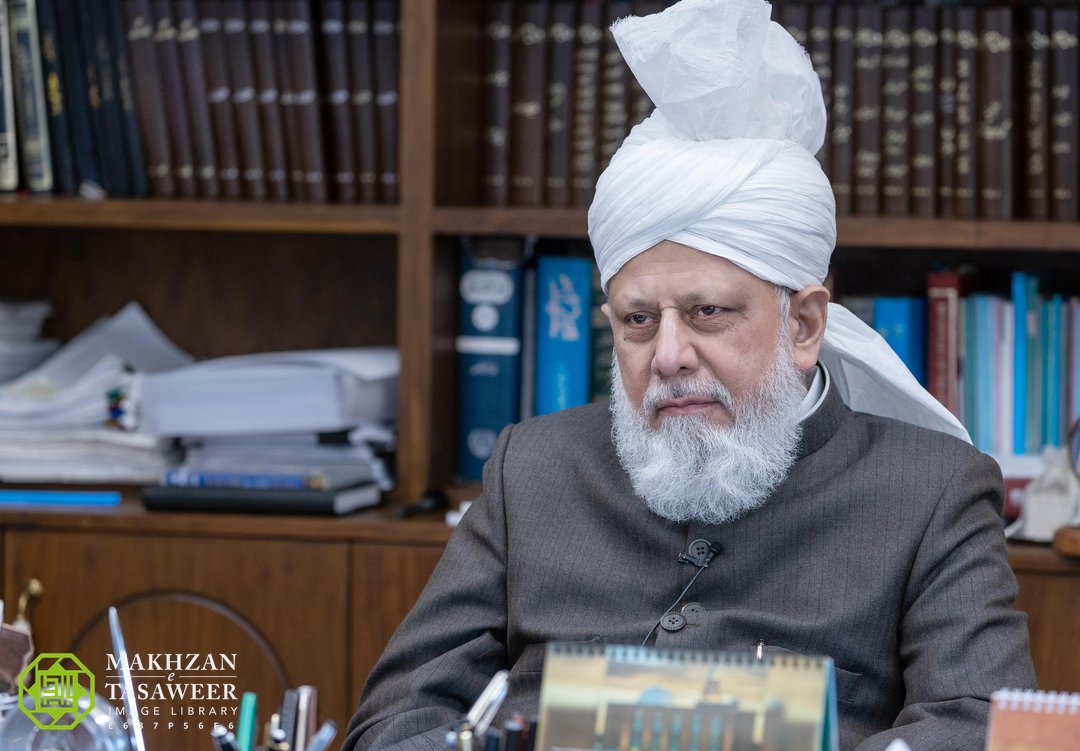
His Holiness also emphasised the need for setting a high moral example as a young Ahmadi Muslim.
Hazrat Mirza Masroor Ahmad said:
“An exemplary Tifl should be morally very good and well behaved. When you go to school, students should know that this boy is very well behaved and so we have to be very careful in front of him; he is the person who does not involve himself in the bad things so we have to be very careful when coming in front of him. When they talk to you, even if they use filthy language you should just avoid them and leave it. And say, ‘It is against the teachings of my religion that I should reply in the same language.’
Further explaining the qualities of an exemplary Tifl, Hazrat Mirza Masroor Ahmad said:
“You should respect your teachers. You should obey your parents and always think that whatever your parents say to you is for your betterment and never think that they are trying to deprive you of your rights or they are not caring for you… If you think that they are caring then you will obey them.”
Hazrat Mirza Masroor Ahmad also stated:
“Be regular in doing your homework when you come back from school and try also to read some religious literature to increase your religious knowledge. And in this way, you will try to make yourself a perfect Tifl. And as the time goes on, you will increase your knowledge and wisdom. And in this way, you can serve the Ahmadiyya Muslim Community and Khilafat in the best way.”
A Tifl asked His Holiness what his routine was on Eid day. In response, His Holiness said that before the Eid prayers he spends time preparing his sermon and after the sermon His Holiness meets his immediate family and spends time calling others to wish them ‘Eid Mubarak’. Apart from that, His Holiness said he spends time for an hour meeting family and having lunch. Thereafter, His Holiness returns to his office and continues with his regular work.
His Holiness was asked why Muslims invoke blessings on the Holy Prophet of Islam (peace and blessings be upon him) and why offering Durood is a means of having one’s prayers being accepted by Allah the Almighty.
Hazrat Mirza Masroor Ahmad said:
“Allah the Almighty says that the Holy Prophet (peace and blessings be upon him) is a human being and he is the person whom I love more than any person in the world. He has brought you the final Shariah – the final law from Allah Almighty… So this is why Allah the Almighty says that you should be grateful to the Holy Prophet (peace and blessings be upon him) that he has brought you such a religion. And the best way to show your gratitude is that you offer Durood Sharif because Allah the Almighty says that since this person is the person whom He loves, more than anyone, any Prophet, so when you invoke Durood, then He will listen to your prayers as well.”
Continuing, Hazrat Mirza Masroor Ahmad said:
“Allah the Almighty says that you should invoke blessings upon the Holy Prophet (peace and blessings be upon him) but don’t think that he is something supernatural – he’s also a human being…. We do not say the Holy Prophet (peace and blessings be upon him) conveys our message (to God). We say Allah the Almighty is listening to us directly but at the same time He asked us to praise the Holy Prophet (peace and blessings be upon him) because He loves him…”
Another Tifl asked His Holiness how he can attract other people towards the message of the Ahmadiyya Muslim Community.
Hazrat Mirza Masroor Ahmad replied:
“First thing is your behaviour; if your behaviour is good, people will get attracted towards you and in this way, you can make more friends. When you will make more friends, they will ask you why you are different from others? Then you can tell them, ‘Because I follow the true teachings of Islam.’.. So then, they will ask you questions about Islam and in this way you can convey the message of Islam…. So, the best way is to set your example before the people then people will get attracted.”
